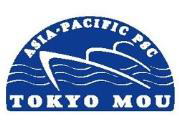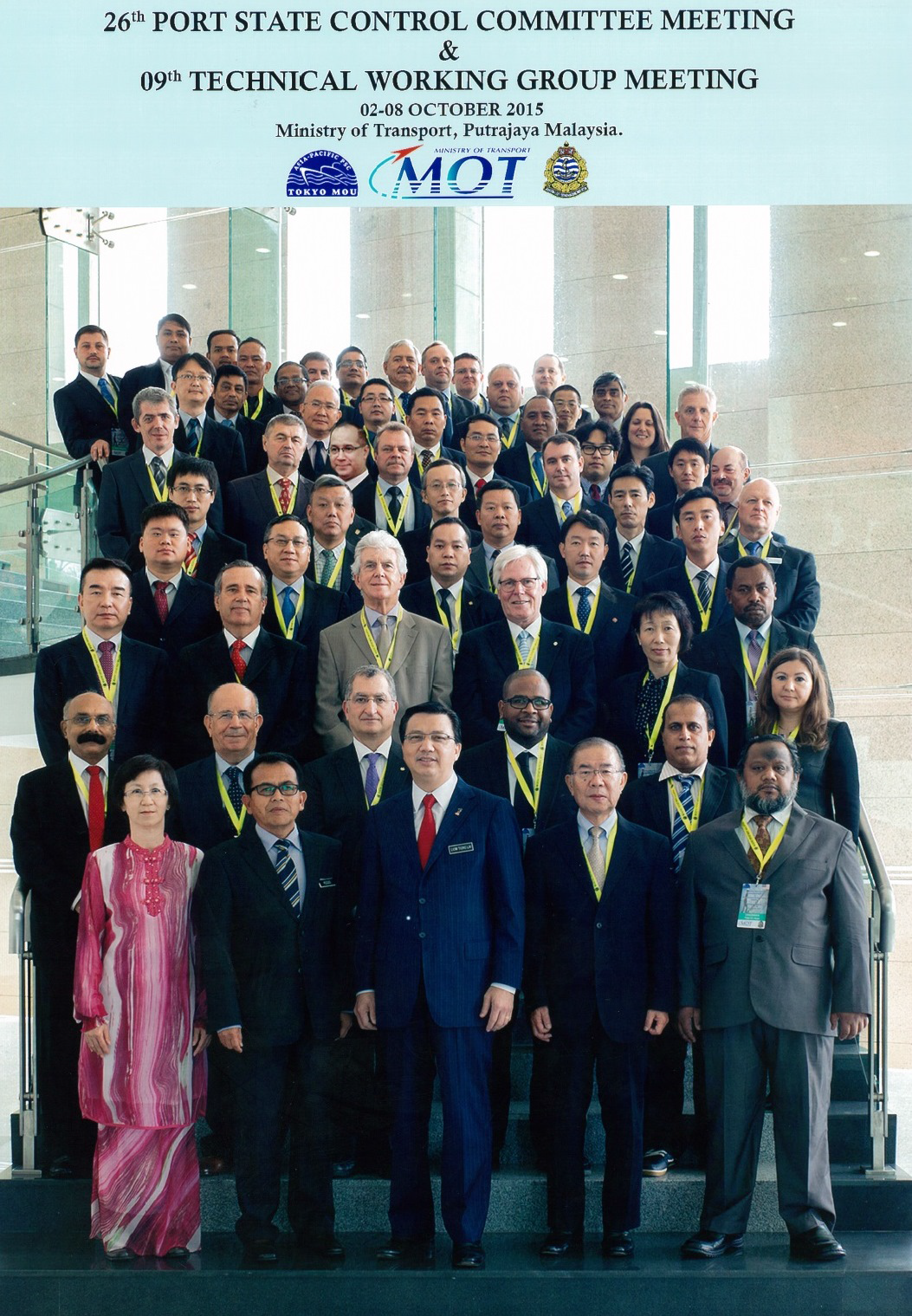
Putrajaya, Malaysia – Representatives of the Port State Control Committee, the governing body under the Memorandum of Understanding on Port State Control in the Asia-Pacific Region (Tokyo MOU), met in Putrajaya, Malaysia, from 5 to 8 October 2015 for its Twenty-Sixth meeting.
The meeting was chaired by Mr. Abdul Samad Bin Shaik Osman, Principal Assistant Director, Maritime Industry Control Division, Marine Department Malaysia. The meeting was officially opened by Dato’ Sri Liow Tiong Lai, Minister of Transport of Malaysia. In his opening speech, Mr. Liow pointed out that port State control plays important role for promotion of effective implementation of international maritime conventions. Furthermore, he commended that Tokyo MOU, as one of the leading regional PSC regimes, had made great success and remarkable achievement on elimination of substandard ships in the region.
Lastly, he reconfirmed the active participation in and continuous contribution to the Tokyo MOU by Malaysia. The Tokyo MOU was concluded in December 1993 and came into operation in April 1994. At present, the Tokyo MOU consists of 19 member Authorities: Australia, Canada, Chile, China, Fiji, Hong Kong (China), Indonesia, Japan, Republic of Korea, Malaysia, the Marshall Islands, New Zealand, Papua New Guinea, the Philippines, the Russian Federation, Singapore, Thailand, Vanuatu and Viet Nam. Peru adheres to the Tokyo MOU as co-operating member Authority. The Democratic People’s Republic of Korea, Macao (China), the Solomon Islands, Tonga, the United States Coast Guard, the International Maritime Organization, the International Labour Organization and the Secretariats of the Paris, the Indian Ocean, the Black Sea and the Riyadh Memoranda of Understanding on Port State Control and the Viña del Mar Agreement are associated with the Tokyo MOU as observers.
The twenty-sixth meeting of the Port State Control Committee was attended by the member Authorities of Australia, Canada, Chile, China, Hong Kong (China), Japan, the Republic of Korea, Malaysia, the Marshall Islands, New Zealand, Papua New Guinea, the Philippines, the Russian Federation, Singapore, Thailand and Viet Nam; co-operating member Authority of Peru; and observers of DPR Korea, Macao (China), the United States Coast Guard, the Black Sea MOU, the Indian Ocean MOU, the Paris MOU, the Riyadh MOU and the Viña del Mar Agreement.
Furthermore, Panama, the newly accepted co-operating member Authority, also attended the meeting. The member Authorities of Fiji, Indonesia, Vanuatu and observers of the Solomon Islands, Tonga, ILO and IMO were unable to attend.
Prior to the Committee meeting, the ninth meeting of the Technical Working Group (TWG) was convened from 2 to 3 October 2015. The TWG meeting discussed matters relating to PSC technical procedures and guidelines, the Concentrated Inspection Campaigns; information system and information exchange, evaluation of work done by intersessional technical groups and technical co-operation activities. Upon completion of a three-year term as a Co-operating Member Authority, Peru applied for a full membership of the Tokyo MOU. The Committee considered the application by Peru and the report of a fact finding mission, which confirmed full compliance with the qualitative membership criteria by Peru. In accordance with provision of the Memorandum, the Committee unanimously agreed to accept Peru as the 20th member Authority. The Committee also considered the application for Co-operating Member status by Panama. The Committee unanimously agreed to accept Panama as a Co-operating Member of the Tokyo MOU in accordance with the relevant provisions of the Memorandum.
The Committee reviewed and revised the Strategic Plan, Strategic Directions and the list of planned actions for five-year period from 2016 to 2020. The Committee considered and approved the amendments to the guidelines for the detention review panel, guidelines for the responsibility assessment of RO and guidelines for PSC officers on Maritime Labour Convention. The Committee approved the new version of the Port State Control Manual, which will be published internally at the beginning of December 2015.
The Committee considered and approved the final report of the CIC on STCW Hours of Rest 2014. Having considered relevant circumstance, the Committee decided to conduct the CIC on Cargo Securing Arrangements in 2016. In this connection, the Committee approved the questionnaire and guidelines for the CIC on Cargo Securing Arrangements in principle. By the agreement with the Paris MOU, the Committee confirmed to carry out a joint CIC on Safety of Navigation in 2017. The Committee approved a revised strategic plan for technical co-operation programmes for the period of 2016-2020. The Committee commended the effective and successful implementation of the technical co-operation programmes. The Committee expressed appreciation to the Nippon Foundation for the support provided to the technical co-operation programmes.
By the initiative of Canada, a Third Joint Ministerial Conference of the Paris and Tokyo Memoranda on Port State Control has been planned to be held in Canada April 2017. A preparatory discussion group meeting was convened in conjunction with the Committee meeting for the purpose of identifying issues to be addressed by the Ministers. The Committee elected Mr. Carlos Fanta, Head, Port State Control Division, Directorate of Maritime Safety, Security and Operation, Directorate General of the Maritime Territory and Merchant Marine (DIRECTEMAR) of Chile, as the new Chairman and Mr. Alex Schultz-Altmann, Manager, Ship Inspection and Registration, Ship Safety Division, Australian Maritime Safety Authority (AMSA), as the new Vice Chairman of the Committee for the next three meetings.
The twenty-seventh meeting of the Port State Control Committee will be held in Australia in October 2016.














Reblogged this on Brittius.
Where is the end of it ? in the time of economical downturn,when ISM has been introduced, ILO enforced - growing number of inspection or so called inspections makes the life ob miserable. The lack of common sense , lack of experience is quite often substituted with arrogance and "must find" attitude. The inspectors are low paid some of them accepting bribes. Yes I know , should not have happened but happens.With all respect , i think that IMO is not serving for shipping community neither for its wealth nor for its growth- on the opposite - creating jobs for themselves . Should i be impressed by CIC named - Cargo Securing Arrangements ? well, why should i be ? Or ILO enforcement ? The last one i have analised for my latest Company and its 33 vessels. To have the fleet certified we spent 145 000 usd- all money went to the Classification society for their service and most of all for their travel. I would like to add that not a single cent was spent for the Crew welfare or their well being . Again 145 000 USD , can you imagine how many fire hoses we could have, or how much food can we get for it ? And that is not the end of it , we will be increasing same budget evry 2.5 year, Nonsense, nonsense, nonsense and pathetic.......
It, is a little bitter, but having spent over 30 years in shipping ( both at sea and ashore) I am not quite confident that we have a competent rulers anymore.......